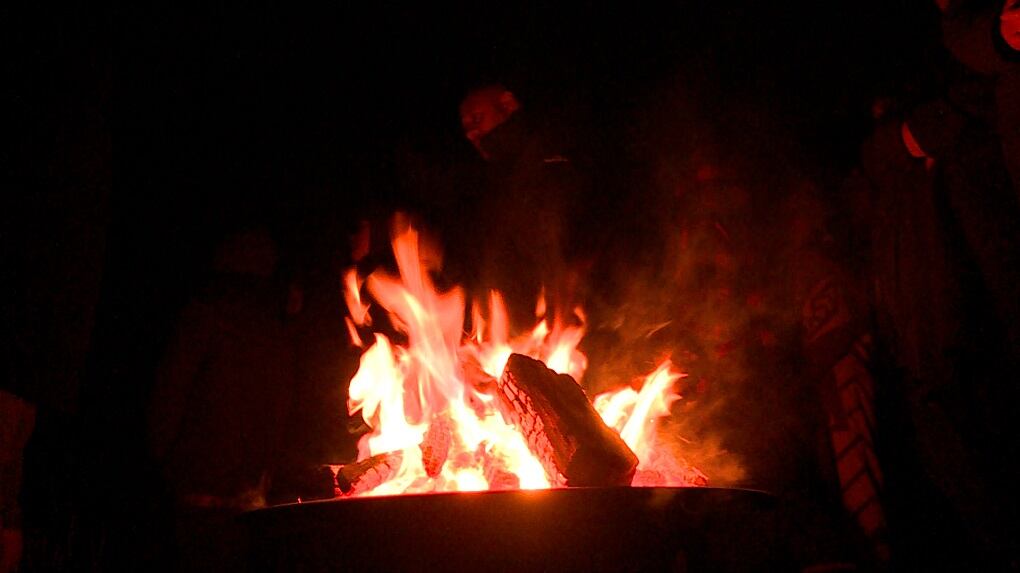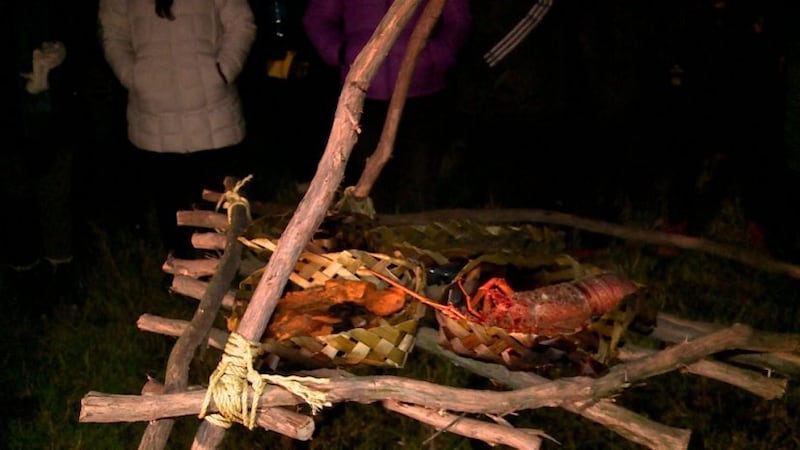Te Arawa leaders say the first New Zealand Matariki public holiday that will start this Friday is more than just a holiday, and is a time to develop and foster the Māori language, culture, and traditions passed down from ancestors.
Matariki is the Māori name of the cluster of stars that rise in the mid-winter and, for Māori, it heralds the start of the new year. It is an opportunity for all people to come together and reflect on the year that has passed, celebrate the present, and plan for the future.
At dawn this morning, close to 200 descendants of Tamatekupa made their way up Ōkūrei Point in Maketu to celebrate Matariki. Maketu is where Te Arawa waka landed before tupuna went inland to discover the likes of Rotorua.
This Matariki gathering is the iwi’s second after last year’s celebration held on the sacred Island Mokia.
Whānau gather for the Umu Kohukohu Whetū on Ōkūrei Point.
Karakia was led by Te Arawa Tohunga Karakia Mataia Keepa and supported by his apprentice tohunga Ranginui Rikirangi- Thomas as they woke the dawn into a new day and welcomed the glistening nine stars of Matariki: Tupuānuku, Tupuārangi, Waitī, Waitā, Waipunaragi, Ururangi, Pōhutukawa, Hiwa-i-te-rangi and Matariki.
Rikirangi-Thomas was quick to say Matariki was not just a public holiday: “Absolutely not. We need to understand that this is an opportunity that draws on the growth of our Māori worldview,” he said.
'Time to ponder'
Stephen Te Moni was one of the leaders in this morning's food offering ceremony, known by Māori as Hautapu or Umu Kohukohu Whetu. Te Moni has been entrenched in Matariki since he was a child.
“And now we get to have a holiday but not forgetting to find time to ponder on the year that has passed but also to reset and build for the year ahead,” he said.
Rikirangi- Thomas was elated with the government’s decision to make Matariki a holiday and said it was a change in the tide and a pull on the ropes of cultural importance in supporting things Māori.
He said Te Arawa descendants rallied together to make the Matariki experience a success, from hanging over 200 lights in paddocks to act as guiding lights as a footpath up Ōkūrei Point, to whānau making kōnae or weaved flax bowls for the hangi or steamed cooked food offerings to the nine stars of Matariki.
“It was a group success and that’s Te Arawa - that’s how we roll,” Rikirangi-Thomas said.

Umu Kohukohu Whetū are performed during the pō tangaroa of the Maramataka Māori during the Matariki season and when Matariki is visible in the sky.
It involves a ceremonial offering of food to the stars of Matariki from an umu or hāngī that has been prepared the night before. The food in the ground is revealed with the steam from the food rising to be eaten by the stars with the people’s hope that the following year’s harvest is plentiful. Various foods from different sources are presented before the stars, from ocean, land, air, and freshwater food sources.
Grieving for loved ones
Another important part of the Matariki celebration during the Umu Kohukohu Whetu ceremony is the opportunity to remember loved ones who have passed, call them out by name, and grieve for them. Māori believe the Pohutukawa star will care for loved ones and watch over them until whānau meet again.
Matariki is also seen as a time to leave behind the struggles and bad choices of the year gone by and reset goals and aspirations as an individual or group leading into the year ahead, with the Hiwa-i-te rangi star the one who can make all these dreams and aspirations a reality.
Te Moni said, “There are a lot of positive outcomes for Māori but also non- Māori when engaging and participating in Matariki. There are many Māori here who are new to this experience and I applaud them for coming”.
There are many Matariki festivals, initiatives, and Umu Kohukohu Whetu ceremonies happening throughout New Zealand this week and this weekend.
Matariki will be celebrated as New Zealand's 11th official public holiday but the first that stems from an Indigenous source.
“We need to continue emphasising this knowledge. We are only skimming the surface of Matariki. We need to go deeper into what our ancestors gave us,” Te Moni said.
Rikirangi- Thomas hopes families will hold their Umu Kohukohu Whetu or food offerings to the gods in their own homes and not have to rely on small volunteer groups.
“And the long-term goal is that we can have more of these all over Te Arawa,” Rikirangi-Thomas said.

